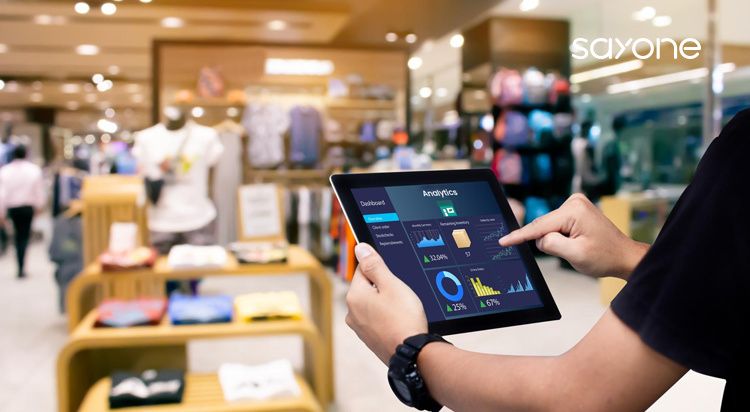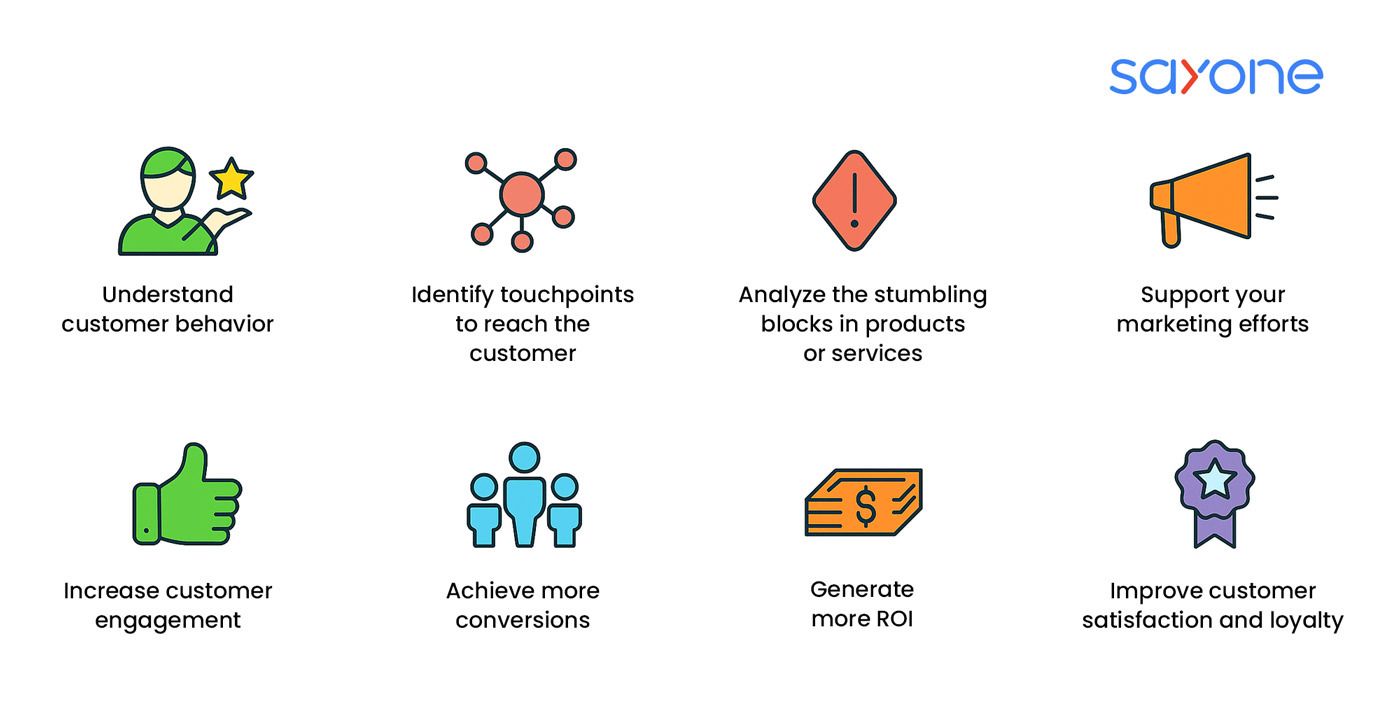
Subscribe to our Blog
We're committed to your privacy. SayOne uses the information you provide to us to contact you about our relevant content, products, and services. check out our privacy policy.

Sree Sankar August 18, 20255 min read

Generating table of contents...
Curious how leading retailers make lightning-fast decisions and stay ahead of the curve? This blog is your roadmap to unlocking the power of AI-driven retail analytics, discover how you can transform data into actionable insights and make smarter, faster business moves starting today.
Retail analytics is the process of using data analysis to gain insights into customer behavior, sales trends, and operational efficiency within the retail sector. Traditionally, retailers relied on historical sales data and gut instinct, resulting in slow, often reactive decisions.
Today, the vast volume and complexity of retail data demand more advanced solutions. AI-powered retail analytics transforms decision-making by harnessing machine learning and advanced algorithms to deliver real-time, actionable insights.
This shift enables retailers to quickly identify patterns, predict demand, personalize the shopper experience, optimize inventory, and respond agilely to market changes. The future belongs to those who leverage AI-driven analytics for smarter, faster, and more profitable decisions.
From initial discovery to post-purchase engagement the entire customer journey can be mapped through AI. By analyzing vast datasets including clickstream data, search queries, browsing history, and social media interactions AI uncovers granular insights into shopper behavior.

For instance, retailers can identify which digital touchpoints lead to conversion, pinpoint moments of friction that cause cart abandonment, and even predict a customer's future purchasing intent. This helps optimize your ecommerce order flow with hyper-personalization at every stage.
Instead of generic marketing, retailers can deliver individually tailored product recommendations, dynamic pricing, and personalized email campaigns that resonate with each shopper's unique preferences, creating a truly bespoke experience that drives loyalty and sales.
AI-driven recommendation engines are transforming e-commerce by delivering highly personalized product suggestions in real time. These systems analyze customer data such as browsing patterns, purchase history, preferences, and even contextual factors like device or location - to anticipate what shoppers are likely to want next. This level of personalization helps retailers guide customers toward products they’re most interested in, reducing choice overload and simplifying purchasing decisions.
For example, AI can instantly suggest complementary items (cross-selling), upsell higher-value products, or recommend alternatives if a product is out of stock. Major retailers like Amazon attribute a substantial portion of their sales up to 35% to the effectiveness of these recommendation systems.
Instead of relying on manual counts and static, rule-based systems, intelligent algorithms analyze vast amounts of real-time data - such as sales trends, seasonal patterns, promotions, and even external factors like weather or trending topics to accurately predict which products will be in demand and when. This proactive approach means retailers can avoid both out-of-stocks and costly overstocking, keeping shelves optimized while reducing storage costs and minimizing lost sales.
A prime example is the integration between platforms like Shopify and NetSuite for warehouse automation. By connecting Shopify’s e-commerce storefront with NetSuite’s robust inventory and order management system, retailers can automate data flow from online purchases right through to warehouse fulfillment.
Automated restocking takes this a step further by triggering reorders and stock transfers the moment inventory drops below predicted thresholds, ensuring high-demand products are always available across all locations.
AI-powered chatbots and virtual assistants have become essential tools in retail, acting as intelligent, automated shopping assistants that provide immediate customer support. Available 24/7, these systems are designed to mimic human conversation and handle a high volume of routine inquiries such as questions about order status, shipping details, product availability, and return policies without human intervention.
Beyond just answering FAQs, these AI assistants serve as personal shoppers, guiding customers through their buying journey. By leveraging Natural Language Processing (NLP) to understand customer intent, they can ask targeted questions and offer personalized product recommendations based on browsing history and preferences.
This proactive engagement not only improves customer satisfaction and fosters loyalty but also directly drives sales by reducing cart abandonment and seamlessly guiding users toward a purchase.
By collecting data from these interactions, retailers also gain valuable insights into customer behavior and preferences.
AI algorithms work by analyzing massive volumes of data from various sources, including transaction details, customer behavior, device information, and IP addresses. These systems establish a baseline of normal activity and then identify anomalies and suspicious patterns that deviate from it.
Key applications of AI in retail fraud prevention include:
AI-powered analytics provide the key to transforming immense volumes of data into clear, actionable insights that drive efficiency, help with personalization, and boost profitability. By adopting artificial intelligence, you aren't just optimizing current operations; you're building a resilient, future-ready business that can anticipate customer needs and instantly adapt to market changes.
Ready to harness the full potential of AI for your retail enterprise? At SayOne, we specialize in crafting bespoke AI solutions that help retailers to lead the market. Our expert team collaborates with you to design and deploy custom analytics tools, from intelligent inventory forecasting to hyper-personalized marketing engines, ensuring you gain a decisive competitive edge. Contact SayOne today to discover how our tailored AI services can help you start making smarter, faster business decisions.

We're committed to your privacy. SayOne uses the information you provide to us to contact you about our relevant content, products, and services. check out our privacy policy.

About Author
Software Engineer | Gen AI | Building the Future

We collaborate with visionary leaders on projects that focus on quality